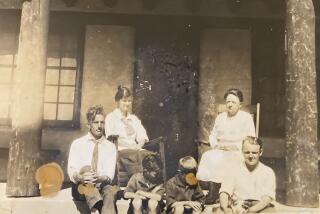Hillerman Puts Himself in the Plot
- Share via
In this genial memoir, 75-year-old New Mexico writer Tony Hillerman looks back at his life and finds it good. That is not surprising, considering that Hillerman has been happily married for half a century, has six children, five of them adopted, and has won fame and fortune writing mysteries set in the stark and beautiful Navajo Nation of the Southwest.
Hillerman’s Navajo sleuths, Joe Leaphorn and Jim Chee, are like old friends to millions of readers, and in “Seldom Disappointed,” Hillerman explains why he created them and how he did his research into the ways of the Dineh, the Navajo people. That is all interesting, but what jumps out of the book, quivering with energy, is Hillerman’s account of his service in a mortar platoon in an infantry company in France during World War II. Not the familiar story of the Normandy landings and the sweep east across the plains of northern France, but the autumn and winter push up from the south by the 7th Army through the frightful Vosges Mountains in Alsace into Germany east of the Saarland.
It is vivid writing, matter-of-fact but intense and utterly believable. Hillerman never rose above private first class. He and his buddies almost never knew what was going on, what their mission was or even, sometimes, where they were. They just tried to do what they were told. They were frightened. They were sometimes bored. They were hungry and exhausted, and they got horribly wounded, and many, many of them were killed. In the military cemetery St. Avold, 20 headstones bear the names of men from Hillerman’s company, Charley, “and scores more from Able and Baker companies,” he writes. They were all in a battalion in the 103rd Infantry Division.
Hillerman doesn’t seem to have a high regard for most of his officers, but in those days, few draftees did. He also has a low opinion of Army Intelligence, which always seemed to find Germans in places where they weren’t and miss them in places where they were. Nor was German Intelligence better, but the Germans had noticed that in Europe it snows in the winter, so their troops wore white uniforms, while the Americans were stuck with their very visible olive drab.
One day there was a violent fight, and Hillerman was later awarded the Bronze Star for his valor. He wasn’t sure why he got one when others didn’t. Yet he writes proudly that the Combat Infantryman’s Badge is the finest decoration the Army can give. And on another day in another blur of noisy combat, Hillerman stepped on an antipersonnel mine, and his war was over. First he was blinded in both eyes, then sight returned to his right and dimly to his left. He spent March through July in an army hospital in Aix-en-Provence, then was shipped home. He says he got through all this because his mother taught him never to be afraid, and his father taught him not to bear grudges. When he writes that, he is to be believed.
Afterward, studying journalism at the University of Oklahoma on the GI Bill, he started working at a newspaper in the Texas Panhandle. He moved on to a wire service job in Santa Fe when New Mexico and its politics were even more rough-and-tumble than they are now. All the while, Hillerman wanted to be a writer of fiction, even when he spent, after his stint in journalism, 20 years as an administrator and teacher at the University of New Mexico in Albuquerque. He started his Navajo mysteries with “The Blessing Way” in 1970, but it was not until 1988 that he published his “breakout book,” “The Thief of Time,” about one archeologist working on Anasazi pottery near the San Juan River who murders another. It made the bestseller lists and was translated into 17 languages.
True to its title, “Seldom Disappointed” is the picture of a man molded and enriched by the searing experiences of the war and the good fortune of his life. Hillerman is clearly at home in that skin.
More to Read
Sign up for our Book Club newsletter
Get the latest news, events and more from the Los Angeles Times Book Club, and help us get L.A. reading and talking.
You may occasionally receive promotional content from the Los Angeles Times.










